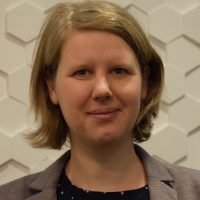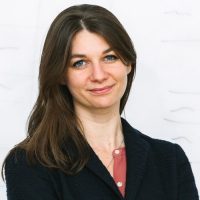
New Ideas for an Evolving Transatlantic Partnership
James Hoobler
James Hoobler was a 2017-2018 participant in AICGS’ project “A German-American Dialogue of the Next Generation: Global Responsibility, Joint Engagement,” sponsored by the Transatlantik-Programm der Bundesrepublik Deutschland aus Mitteln des European Recovery Program (ERP) des Bundesministeriums für Wirtschaft und Energie (BMWi).

Julian Mueller-Kaler
Stimson Center
Julian Mueller-Kaler is the Director of the Strategic Foresight Hub in the Executive Office at the Stimson Center and also serves as Chief of Staff to the President and CEO. He coordinates and manages special projects, advises on strategy, and supports institutional advancement. As director of the Hub, he researches global trends, evaluates the implications of emerging technologies on society and politics, and writes about the rise of populism, US-China relations, and the future of the liberal international order.
Before joining Stimson, Mueller-Kaler was a resident senior fellow with the Atlantic Council GeoTech Center and the Scowcroft Strategy Initiative where he worked on the geopolitics of technology and lead the GeoTech Center’s AI Connect program – a joint work stream with the U.S. Department of State that encouraged the responsible stewardship of AI technologies in the Global South. He also serves as a non-resident fellow at the American-German Institute, is an associate fellow at German Council on Foreign Relations (DGAP) in Berlin, and previously consulted in the office of the German Executive Director at the World Bank Group. Mueller-Kaler graduated as a Fulbright-Schuman scholar (MA) from Georgetown University’s School of Foreign Service and holds a degree in International Relations (BA) from Zeppelin University in southern Germany.
He was a 2017-2018 participant in AICGS’ project "A German-American Dialogue of the Next Generation: Global Responsibility, Joint Engagement," sponsored by the Transatlantik-Programm der Bundesrepublik Deutschland aus Mitteln des European Recovery Program (ERP) des Bundesministeriums für Wirtschaft und Energie (BMWi).

Kirsten Verclas
ORISE Science and Technology Policy Fellow
Kirsten Verclas is an ORISE Science and Technology Policy Fellow. Previously, she was a Program Manager in the International Department of the National Association of Regulatory Utility Commissioners (NARUC) working on regulatory partnerships in Africa under a NARUC-U.S. Agency for International Development (USAID) Cooperative Agreement. Before coming to NARUC, Ms. Verclas was a Senior Program Manager at the American Institute for Contemporary German Studies (AICGS) at Johns Hopkins University, where she managed the Institute’s grant projects. She initially joined AICGS as Executive Assistant in 2003 and started working in the Institute’s Research Program in 2008. Ms. Verclas has written extensively on energy and climate as well as security policy in the transatlantic context. She holds a BA in International Relations with a Minor in Economics from Franklin and Marshall College and an MA in International Relations with a concentration in Security Studies from The Elliott School at The George Washington University. She also earned an MS in Energy Policy and Climate from Johns Hopkins University in August 2013.
She is a 2017-2018 participant in AICGS’ project “A German-American Dialogue of the Next Generation: Global Responsibility, Joint Engagement,” sponsored by the Transatlantik-Programm der Bundesrepublik Deutschland aus Mitteln des European Recovery Program (ERP) des Bundesministeriums für Wirtschaft und Energie (BMWi).

Laura Daniels
Center for Strategic and International Studies
Laura Daniels is an Associate Fellow in the International Security Program at the Center for Strategic and International Studies (CSIS). Previously, she was the German Chancellor Fellow at the Global Public Policy Institute (GPPi) in Berlin and a visiting fellow at the French Institute of International Relations (IFRI) in Paris. Her current research involves analyzing the evolution of political warfare and Russian influence in Europe. She specializes in U.S. foreign policy and grand strategy, transatlantic relations, and counterterrorism.
Prior to GPPi, Laura was the research assistant for the International Order and Strategy Project at the Brookings Institution in Washington, DC. Her professional experience additionally includes positions at the United Nations and the European Parliament Liaison Office to U.S. Congress. Laura is a term member of the Council on Foreign Relations, a Presidential Management Fellowship finalist, and a member of the German Marshall Fund Young Transatlantic Network. She holds a master of public administration in international security policy from Columbia University’s School of International and Public Affairs and a bachelor’s from New York University.
She is a 2017-2018 participant in AICGS’ project “A German-American Dialogue of the Next Generation: Global Responsibility, Joint Engagement,” sponsored by the Transatlantik-Programm der Bundesrepublik Deutschland aus Mitteln des European Recovery Program (ERP) des Bundesministeriums für Wirtschaft und Energie (BMWi).

Niklas Helwig
Niklas Helwig was a DAAD/AICGS Research Fellow in October and November 2018. Prior to his research stay at the AICGS, he was a Transatlantic Post-Doc Fellow for International Relations and Security (TAPIR fellow). He was based at the RAND Corporation and the Center for Transatlantic Relations in DC, as well as at the German Institute for International and Security Affairs (SWP) in Berlin. Between 2014 and 2016. he worked as Senior Research Fellow at the Finnish Institute of International Affairs in Helsinki. Dr. Helwig was also a Visiting Researcher at the Centre for European Policy Studies in Brussels. He researched and taught at the University of Cologne and the University of Edinburgh, from where he received a double PhD (‘co-tutelle’). Dr. Helwig was a Marie Curie Early Stage Researcher in the Initial Training Network on EU external action (EXACT).
Dr. Helwig’s research interests include Germany’s foreign and security policy, European defense cooperation, transatlantic security cooperation, as well as the EU as a Global Actor. He wrote extensively for think tanks, online blogs, and academic journals, including European Foreign Affairs Review, The International Spectator, Internationale Politik und Gesellschaft, Huffington Post, EurActiv, and War on the Rocks.
During his time at the AICGS, Dr. Helwig analyzes U.S. domestic perception of the transatlantic alliance during the 2018 midterm elections. Lately, the U.S. administration emphasized a transactional perspective on the relationship with its allies. Historically, however, it can be argued that the transatlantic alliance was about more than economic prosperity and mutual defense, and instead based on a broader societal belief in shared values and identity. By analyzing the debates around midterm races across the U.S., the project aims to shed light on the question whether this notion still holds true in today’s America.
Additionally, he was a 2017-2018 participant in AICGS’ project “A German-American Dialogue of the Next Generation: Global Responsibility, Joint Engagement,” sponsored by the Transatlantik-Programm der Bundesrepublik Deutschland aus Mitteln des European Recovery Program (ERP) des Bundesministeriums für Wirtschaft und Energie (BMWi).

Peter Rough
Hudson Institute
Peter Rough has been a fellow at Hudson Institute in Washington, DC, since 2014. He writes and comments on U.S. foreign policy toward Europe and the Middle East and edited Hudson’s journal, Current Trends in Islamist Ideology. Prior to joining Hudson, Peter collaborated on a social history of World War I in the Middle East, A Land of Aching Hearts, published by Harvard University Press in fall 2014. A former associate director in the White House Office of Strategic Initiatives, he also served as director of research in the Office of George W. Bush, assisting the former president with his memoir, Decision Points.
Peter has completed stints as a policy analyst at the U.S. Agency for International Development and as an advisor to U.S. Army Special Operations Command. He also helped direct foreign policy working groups for the Romney and Rubio presidential campaigns, focusing on Russia and the Middle East, respectively. A proud native of Des Moines, Iowa, he is a graduate of the George Washington University and the Fletcher School of Law and Diplomacy, where he was a Cabot Corporation Scholar. He is a native German speaker.
He was a 2017-2018 participant in AICGS’ project “A German-American Dialogue of the Next Generation: Global Responsibility, Joint Engagement,” sponsored by the Transatlantik-Programm der Bundesrepublik Deutschland aus Mitteln des European Recovery Program (ERP) des Bundesministeriums für Wirtschaft und Energie (BMWi).

Pia Seyfried
German Bundestag
Pia Seyfried is a legislative assistant for European policy in the German Bundestag and an assistant to the board of Women in International Security Germany e.V. (WIIS.de). She gives lectures on European affairs at the Berlin School of Economics and Law, and publishes articles focusing on EU security policy and intelligence cooperation. Pia Seyfried holds MAs in Political and European Affairs from the Institut d’Etudes Politiques Lille, the University of Münster, and the College of Europe in Warsaw. In a voluntary capacity, she works as the Young DGAP’s Deputy Speaker and manages the Salon Kaleidoskop.
She is a 2017-2018 participant in AICGS’ project “A German-American Dialogue of the Next Generation: Global Responsibility, Joint Engagement,” sponsored by the Transatlantik-Programm der Bundesrepublik Deutschland aus Mitteln des European Recovery Program (ERP) des Bundesministeriums für Wirtschaft und Energie (BMWi).

Sonja Thielges
German Institute for International and Security Affairs (SWP)
Sonja Thielges is a Geoeconomics Non-Resident Fellow. She was a DAAD/AGI Research Fellow from mid-March to mid-May 2019 and explored foreign policy interests in Germany and the United States related to the countries’ energy transitions. In Germany, she is a researcher at the Research Cluster Climate Policy and Politics at the German Institute for International and Security Affairs (SWP) in Berlin. Her research interests include climate foreign policy, the global energy transition and industrial decarbonization. Her research has been published in studies, policy papers, online blogs, and academic publications.
Prior to SWP, Sonja was head of the Industrial Decarbonization research group at the Research Institute for Sustainability (RIFS, formerly Institute for Advanced Sustainability Studies, IASS) in Potsdam. She was a visiting researcher at the University of Michigan’s Center for Local, State, and Urban Policy in Ann Arbor in 2014 and previously also worked on projects at the Environmental Policy Research Centre (FFU), the Institut für Europäische Politik (IEP) Berlin, and the Centre International de Formation Européenne (CIFE). In 2017/2018, Sonja was a participant in the AGI project “A German-American Dialogue of the Next Generation: Global Responsibility, Joint Engagement,” sponsored by the Transatlantik-Programm der Bundesrepublik Deutschland aus Mitteln des European Recovery Program (ERP) des Bundesministeriums für Wirtschaft und Energie (BMWi). She completed an MA in North American Studies, Political Science, and Modern History at Freie Universität Berlin and Indiana University Bloomington and holds a PhD in political science from Freie Universität Berlin. Her PhD thesis studied climate policy discourses in the U.S. Rust Belt states.
Foreign and Domestic Policy Recommendations
During 2017-2018, the AGI project “A German-American Dialogue of the Next Generation: Global Responsibility, Joint Engagement” examined transatlantic challenges and new ideas for the German-American-European partnership in three areas: Foreign & Domestic Policy; Geoeconomics; and Society, Culture & Politics. A group of American and German scholars and experts of the next generation developed several recommendations for the foreign and domestic policy area, focusing on four core areas of transatlantic challenges:
• Energy and Climate
• Trust and Populism
• Security and Defense
• Iran
In this, two questions are the guiding leitmotiv:
What are the current challenges for the transatlantic partners?
How can transatlantic cooperation be used to develop solutions to those challenges?
The subsequent actionable recommendations that were developed by the group underscore the importance of the transatlantic partnership, the key role of the United States and Germany, and the necessity of fostering transatlantic ties on multiple levels – federal, state, local, and personal.









